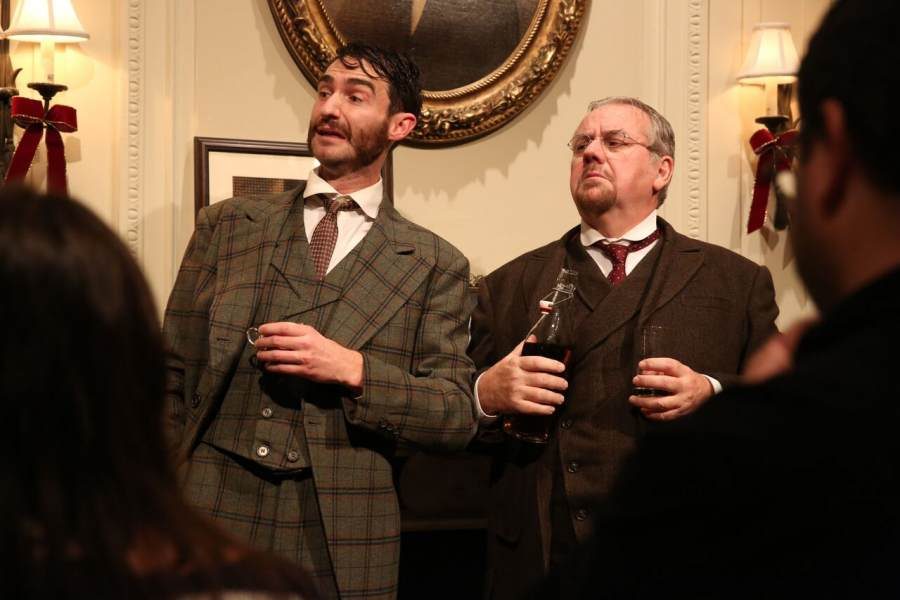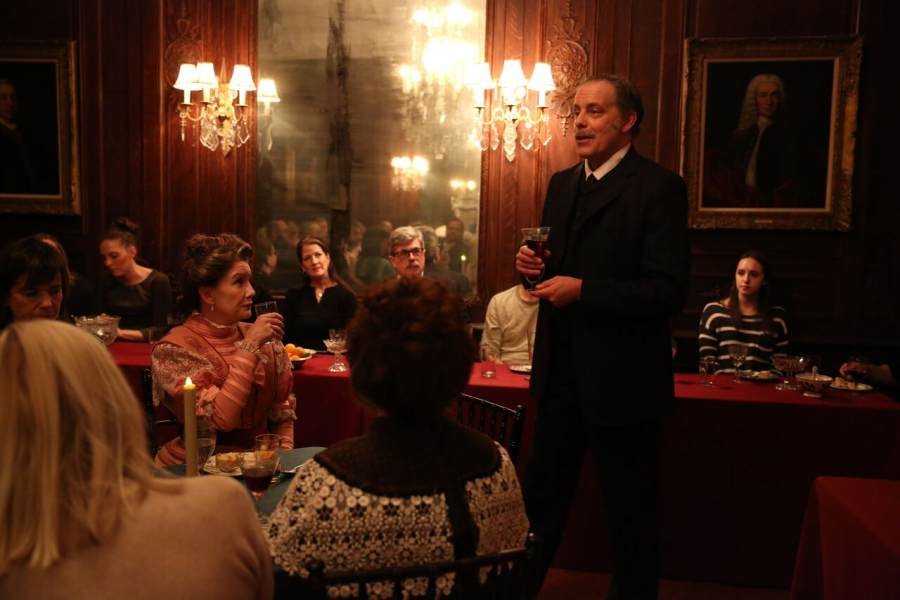

What could be more festive than a Christmas feast among the dead? In “The Dead,” the concluding tale in James Joyce’s 1914 short story collection, Dubliners, the seminal modernist paints the attendees of the Morkan sisters’ annual Feast of the Epiphany celebration in painstaking detail. Playwrights The Dead, 1904, now in its second annual run at the American Irish Historical Society. It’s a sumptuous, immersive evening — made all the more so, if you get lucky like I did, by the snow that blanketed the Upper East Side — featuring singing, dancing, a sit-down dinner amongst the cast, and plenty of port and Guinness to go around.
James Russell plays Freddy Malins, a perpetually drunk young man, who, as expected, shows up “screwed,” with no plans of sobering up. He chatted with StageBuddy about working with the Irish Rep, adapting to immersive theatre, and why you might want to pass on that third glass of sherry.
So first things first, how did you get involved with the project?
I've been working with the Irish Rep for the past five years now, and I've worked basically every fall in a production with them, mostly with Ciarán O'Reilly as the director. Last year, Ciarán reached out to me and asked me if I'd be interested in being a part of this production. I'd never read “The Dead” before, so I gave it a read, and I was blown away by the story and the writing of James Joyce. I leapt at chance of working with Ciarán again, and with Kate Burton and Boyd Gaines for the first season. Then for the second time around, I had so much fun the first time it was sort of a no-brainer to jump back in again.
Has it changed since last year?
A lot of things have stayed the same. For the returning actors, the things that worked the first time around, you don't want to necessarily give them up, and you don't necessarily want to keep them the exact same. You kind of trust that there is a path, and we have gone through trial and error and knowing what works and what doesn't work in that space and with that kind of intimate audience. It’s about just trying to trust the groundwork that we had already laid the first time around. Then also being comfortable and trusting ourselves a little bit more the second time around has been really great, because you kind of slip back into the groove as opposed to trying to forge a new path.
How closely did you work with Joyce’s text? Were you asked to read it before you joined the cast? Was the cast encouraged to engage with it?
Knowing that this is the source of the play, I wanted to tap into that source initially, and then, from there, let everything else grow out of that. The actual story is the inspiration for Jean [Hanff Korelitz] and Paul [Muldoon] to adapt it into a play. So it was important to get in the same stride as them in that sense.
Also the inspiration for creating the character of Freddy Malins — the amount of detail that Joyce spends with each character is invaluable for your creation of the role.

The American Irish Historical Society is such an incredible venue — did you know anything about it before this performance? Do you get to see any hidden areas?
I really didn't know anything about it beforehand, but yes, it's a very impressive space. I've been to the Met before, and it's always so impressive to be in that area, where you see all of the embassies and the old Victorian mansions — and the American Irish Historical Society is one of those mansions. And then, actually being able to go in there, it becomes like your second home when you're spending so much time there.
We do get to see a little bit of some other rooms that I guess the audience is not privy to. A lot of the actors wait for curtain call in the backroom on the third floor, and they've got a lot of cool statues and artifacts — there's the Proclamation of Independence from the Republic of Ireland, and I think it's one of the original ones. There's some amazing paintings and drawings. There's so much history in that building, and they take very good care of it.
As an actor, how does immersive theatre — both preparing and performing — compare to a more traditional role?
The intimacy is something that you normally don't get to experience on such a level, in theatre at least. For some parts of the performance, they're literally right next to you. At the dinner scene, I'm sitting next to an audience member. You’re also moving in between the audience members. In the first year of the production, I was very uncomfortable for, I would say, the first week and a half or previews, as were a lot of other actors, just because it's a very fragile situation. You have a performance, but then, at the same time, you have this area of the unknown. If there's a really drunk person that's going to push you or... (laughs) I don't even know. It's not like I'm fearing for my life, but at the same time you have a job to do, and you don't want that to be interfered with. Now, because we've had so many different variations with the audience, I trust it a lot more, and I trust myself a lot more in the situation that, if something were to come up, we've got it. We've had so many different instances of various things that we're ready for whatever.
I was amazed by that because I did have an experience at the performance I attended —- where a woman suddenly had a health issue and the whole performance was put on pause —- yet the actors all kept their cool.
It is a delicate situation. If the show needs to be stopped, then we kind of leave that to the powers that be in terms of stage management, to stop the show. Just me personally, I like to stay in character for the entire performance. If I am needed to help in the situation, or if it calls for me to break character, I obviously will break character. We just have to judge it. Most of the time there are enough hands on deck that someone else whose job it is to actually handle that situation will handle it, and we're maybe not called upon to be one of the first responders.
There's certainly a lot of booze flowing throughout the evening... has there ever been a ridiculous or inappropriate thing an audience member has done that you've had to adapt to or were shocked by?
The first year we did have one audience member that was really, really drunk. There was one instance in the beginning where he got really close to me during a scene I had with Peter Cormican, who plays Mr. Browne. And he was so close to me that he was basically blocking the entire scene from being seen from the rest of the audience member's perspective. I basically just made broader gestures with my arms to kind of push him out of my personal space, and that seemed to do the job for the time being. Then afterwards, other actors clocked that something was up, and backstage we would notify stage management. We were like, "This guy needs to leave, or he cannot sit with us at the table." (laughs) We're pretty sharp on figuring out what's best for us and protecting the performance and protecting the company.
But it seems like, in general, audiences are pretty well behaved?
They are, yeah. They don't want to be in the spotlight. They're there to watch the performance, not be in it. Although there definitely are people who want to get involved a little bit. Their intentions are in the right place, but at the same time, it's kind of like, let us do the show. Just enjoy it.